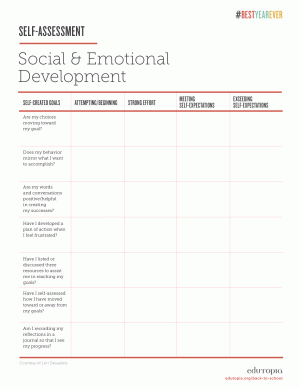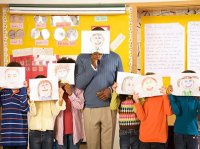Self-Assessment Inspires Learning
Your content has been saved!
Go to My Saved Content.Self-reflection is self-assessment, and one of the most significant learning tools we can model for our students. Ultimately, we want our children and adolescents to be the self-assessors of their work, dispositions, and goals. Research repeatedly reports that the difference between good teachers and superior teachers is that superior teachers self-reflect.
The brain is wired for this strategy, and it has been a part of our evolution. When we teach to a child's or adolescent's brain, we empower that student with the "inner resources" that directly affect his or her ability to pay attention, engage, and create meaningful learning experiences. School culture is simply about relationships, and the brain is a relational organ designed to survive, think, and feel. People change people; programs do not create sustainable meaningful changes. Through the integration of resiliency research coupled with a deep understanding of how our neuroanatomy affects the stress response system, and our attention and ability to remember, we no longer need to manage behavior. Instead, we begin to engage one another.
Simply stated, when the brain feels any type of a threat (emotional, social, or cognitive stress) the thinking part shuts down. Unless a school culture feels or is perceived as "safe," learning does not occur. We are unable to process, integrate, and remember topics, concepts, and standards. Educational neuroscience is about creating states of mind for learning that initiate curiosity, anticipation, autonomy, self-reflection, and awareness.
The following self-assessment survey, created for students and educators, provides questions that address short- and long-term goals. In doing so, it provides a framework for metacognition (thinking about our thoughts) and helps us each to clarify, reflect on, and prioritize our feelings, actions, and behaviors. It allows us to begin feeling a sense of autonomy throughout our learning processes.

I designed this rubric (click to enlarge) for educators to share with students so that daily standards, subject matter, and behaviors presented in the classroom and schools can reflect the integration of significant and smaller incremental goals. Here is where the rubber meets the road, because when any of us emotionally experiences the connections to what we do and say -- either in alignment with our desires and plans or completely off the intended track -- we can become intrinsically motivated to pursue those short-term goals. And we know that, in the process, we not only begin to feel better, but we also begin to see and reap the benefits of our efforts. These come through making mistakes, confronting challenges, and seeing through a lens that is broader than the classroom walls. They become helpful perspectives and resources in self-perseverance, creative visualizations, and self-awareness.
Big Goals
- Completing project successfully
- Summer job
- Peer tutor or advocate
- Guest presenter in a class or organization
- Manuscript submission
- Volunteer position
- Improved grades in school
- Joined organization or clubs
Daily Goals
- Work completion
- Dialogued about frustrations
- Stayed focused on assignments
- Showed respect and compassion for others
- Regrouped and continued on with work after a frustrating time
- Helped another teacher or student
- Contributed some ideas and suggestions to a conversation
- Used positive language in describing a need or desire
- Self-reflected how my daily work and interactions affect my big goal
- Shared big goals with parents, administrators, and community members
- Created a personal statement, visual, and/or tool for encouragement when working on big goals
- What do I need?
- What resources (people, activities, or things) could assist me in reaching my small and larger goals?
- How can I show that I am progressing to bigger goals?
- What can my class do to assist me?
- What can my teacher do to assist me?
- How do I handle negative situations? When these situations occur, what do I typically say to myself?
- What would be a statement that would encourage me?
- Who are my heroes? What are the character traits I admire in these people that make them my heroes?
- How will I personally know when I am on the right track toward my goals? What will tell me if I stray off the track?
- What are three negative emotions I feel most often?
- What are three positive emotions I feel often or sometimes?
- How could creative visualization help me?
- How could I learn to begin again even after a day of small mistakes?
- What three strategies can my school or teacher adopt that would assist me in moving toward my goals?
- What two or three challenges or obstacles prevent me from reaching small or big goals?
- What are my strengths?
- What are my challenges?
- How will I plan to focus on these strengths knowing that my thoughts and feelings drive my behaviors and words toward others?
